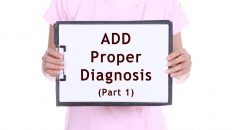By Jerry Morris, PsyD, MsPharm, MBA
MB (Marc Braman, MD, MPH):
Our topic this session is ADD, Understanding the Problem. Thank you for joining us, Dr. Morris.
JM (Jerry Morris, PsyD, MSPharm, MBA):
Glad to be here again, Marc.
MB:
So as we were talking, we realized that we really have to get a good handle on what is going on with ADD to properly understand how to approach the whole topic. In a few words, can you tell us what the fundamental problem is?
JM:
Yes. If we really want to conceptualize this simply, we have a need to grow enough neurons or power in the front part of the brain outer cortex, the frontal lobes, to inhibit some of the lower and posterior areas of the brain. We call that “maturation.” In other words, we have to get to the point where we are sorting needs and drives and impulses from the lower and back part of the brain and able to inhibit some, channel some a little more wisely and to control the output and its appropriateness of our behavior.
MB:
So in essence, if I’m picturing this in my mind, the part of my brain right behind my forehead is what’s regulating all the rest of me. Is that correct?
JM:
That’s correct. Probably, phylogenetically, it developed last, and it becomes the executive functions or the choosing, regulating, inhibiting part of our brain. And some environments, and some relationships, and some nutrition, and some exercise, and some experience develops that part of the brain better than others. And we have the science now to prove that.
MB:
So whatever else is going on whatever else is causing it, it all comes back to this part of the brain right behind the forehead, that keeps us in control of ourselves.
JM:
That’s correct. In fact, we used to think that genetics pretty well determined this development of our brain. But studies have repeatedly shown, and some released again in the last month, show that at least 60% of personality is learned. So even though we have some genetic predispositions to temperament, some of us are “actor-outers” some of us are “actor-inners.” Some of us have a little more energy level than others. The essence of our personality in our brain is from our experience.
MB:
So if this is happening in this part of the brain, and it’s a matter of growth and development, primarily our environment, what’s going on around us? How would you explain ADD to people?
JM:
Well, that’s a great disorder to explain it with. First of all, these scientific nomenclature, these labels we put on different emotional disorders, can really be looked at as scientific terminology for developmental levels, or levels of maturity or immaturity. In other words, if you have Attention Deficit Disorder, you have something that all kids go through. Every kid has a period where they look like an Attention Deficit Disorder or a mood disorder, like a major depressive or a bipolar disorder. But their parents, their environment, their nutrition, their exercise, their neighborhood, their schools, their community starts to work on refining their immaturity and growing these additional frontal lobe areas so they can inhibit and channel more effectively. And when we do that, we say they’re no longer at that developmental level, or they’re growing up, or maturing.
MB:
So essentially, every single one of us by default from birth, essentially potentially has ADD, or bipolar disorder, or major depression, and its simply a matter of our growth and development that gets us past that, that gets us to a healthy functional place?
Environmental adversity and increasing genetic risk for externalizing disorders. Hicks BM, South SC, Dirago AC, Iacono WG, McGue M. Arch Gen Psychiatry. 2009 Jun;66(6):640-8. doi: 10.1001/archgenpsychiatry.2008.554.
Predicting adult physical illness from infant attachment: a prospective longitudinal study. Puig J, Englund MM, Simpson JA, Collins WA. Health Psychol. 2013 Apr;32(4):409-17. doi: 10.1037/a0028889.
Behavioral genetics and child temperament. Saudino KJ. J Dev Behav Pediatr. 2005 Jun;26(3):214-23. Review.





